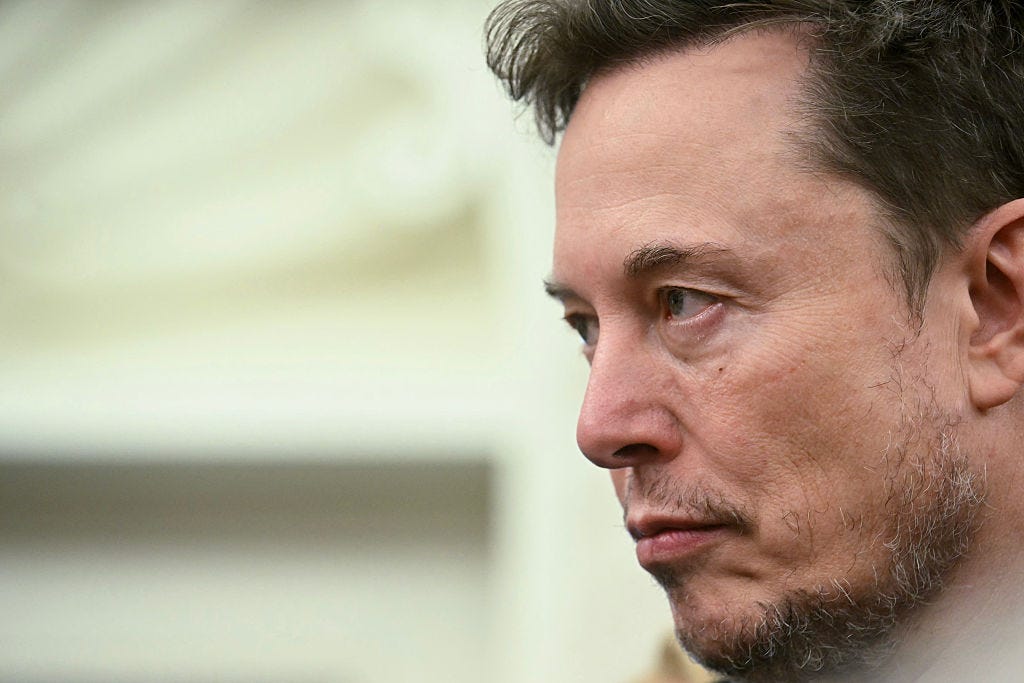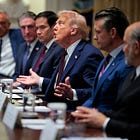Our Coming Plutocracy
Why Larry Ellison and Elon Musk threaten republican government in America.
We are delighted to feature Francis Fukuyama in the pages of Persuasion once again. Some of you may not know that he writes a regular column, “Frankly Fukuyama,” which is proudly part of the Persuasion family, and which you need to manually opt in to receive.
To get all of Frank’s writing—and to get articles from American Purpose, the magazine he founded, and its culture-focused podcast, Bookstack—simply click on “Email preferences” below and make sure you toggle on the relevant buttons.
I wrote back in January about “Elon Musk and the Decline of Western Civilization,” and I’m sorry to report that the decline continues unabated.
The past two weeks have brought news items that illustrate the point. On September 5, Tesla’s board announced an incentive package for Elon Musk that offered him a trillion dollars if he met some very ambitious goals for Tesla’s stock. The second was a series of moves by Larry Ellison, CEO of Oracle, and his son David, to consolidate a business empire that could eventually include, in addition to Oracle, Paramount Global, Skydance Media, MTV, CBS, Warner Brothers/Discovery (which owns HBO and CNN, among other properties), and Bari Weiss’ Free Press.
These are troubling developments from the standpoint of American democracy, for somewhat different reasons.
Tesla’s trillion-dollar pay package to Elon Musk was ostensibly intended to keep Musk focused on improving Tesla’s performance without being distracted by politics, his other businesses, or his relentless postings on X. The offer has already been criticized on business grounds. It seems very unlikely that Tesla’s stock can actually hit the price targets set in the deal, given the damage that Musk has already done to the brand with his political activities, and the increasing competition from China as well as legacy car makers who are moving into the electric vehicle space. Future growth will depend on untested technologies like robotaxis and humanoid robots, where there will be competition, technological setbacks, and uncertain demand.
But what is offensive about this offer to anyone concerned about the future of democracy is its sheer size. The U.S. federal budget deficit for this year is expected to come in at $1.9 trillion, and the Republicans’ Big Beautiful Bill is expected by the Congressional Budget Office to add another $3-4 trillion over the next decade. So if Musk wins this payout, he could single-handedly close a significant part of the national deficit, and personally fund all the Medicare, early childhood education, foreign aid, and other programs being cut as part of the BBB’s effort to minimize the deficit. Given that U.S. GDP last year was about $28 trillion, the payout implies that one man contributed more than 3.5 percent of the nation’s total output, while the other 340 million of us produced the remaining 96.5 percent.
Underlying the Tesla board’s offer is the view that a single individual can create a trillion dollars of new wealth. This feeds into the Ayn Randian narrative that progress is made by individual geniuses who spring up out of the earth like gods and bring benefits to the rest of us. The fact of the matter is that Musk is indeed a genius in certain specific ways, particularly in industrial organization. But Tesla’s success is a collective one, based on all of the engineers, designers, marketers, and factory floor workers who labor there. There is no recognition here of Tesla’s success being the result of social cooperation or team effort. Musk almost never credits his colleagues for his company’s rise. This individualist focus has become typical of American capitalism, and anathema to the way that many European and Japanese corporate leaders think about their own roles.
Musk’s pay incentive is, frankly, ridiculous. The idea that Musk needs this kind of reward to help his own company do well strains credibility. If Tesla’s potential failure isn’t enough to keep him focused, he probably shouldn’t be CEO in the first place. The payout is so outlandish that it’s not at all likely to happen; what is disturbing is the thinking that underlies the Tesla board’s decision.
The Ellison father-son moves are more in the mode of Silvio Berlusconi’s takeover of Mediaset or Elon Musk’s earlier purchase of Twitter. If they succeed in creating this media empire, they will control a vast array of outlets, both legacy and new media, that will allow them to directly influence American politics. Larry Ellison is a Trump supporter as Musk once was; he doesn’t appear to have political ambitions, though his son may. But that’s not the point. The real issue is the impact of concentrated wealth on American democracy, where two or three individuals control so much wealth and media power that they can help swing national elections, as Musk claims he did in 2024.
The Supreme Court’s 2010 Citizens United decision that declared campaign spending to be protected by the free speech provisions of the First Amendment looks worse and worse as time goes on. Context matters here: corporations and wealthy individuals may have speech rights, but concentrations of wealth in the United States have gotten so extreme that the speech of a few individuals is vastly more impactful than that of the rest of us. Since the rise of the free-market Chicago School in the 1970s and 80s, American antitrust law has come to focus much more heavily on the economic harms of concentrated wealth. It does not take into account the potential political harms that such wealth enables.
Americans also need to ditch this worship of great individuals as sources of national wealth and power. Yes, we have benefited from innovators and builders, but the country’s success has always been built on our social virtues: the ability of Americans to work together and to build strong organizations, both in the private sector and in civil society. That sociability has always required trust, and it is trust that has lately been in short supply in American society.
Elon Musk is currently embroiled in a fight over a proposal from his Boring Company to dig some drainage tunnels under the city of Houston. A local legislator bristled over criticisms of Musk, calling him the “smartest man on the planet.”
Musk may be smart in certain ways, but in others he’s extremely stupid. Any competent CEO should know better than to take actions that would alienate the most important customer base of his company—which is exactly what he’s done with Tesla. He seems completely oblivious to the way that people outside his fanbase perceive him, suggesting at one point that people trashing his brand must be paid by the Democrats. Why else would anyone not admire him? Musk is in effect extorting his own company, threatening to walk away from it if he doesn’t get his payday. This is not the behavior of an institution-builder, but of a self-centered narcissist.
Francis Fukuyama is the Olivier Nomellini Senior Fellow at Stanford University. His latest book is Liberalism and Its Discontents. He is also the author of the “Frankly Fukuyama” column, carried forward from American Purpose, at Persuasion.
Follow Persuasion on Twitter, LinkedIn, and YouTube to keep up with our latest articles, podcasts, and events, as well as updates from excellent writers across our network.
And, to receive pieces like this in your inbox and support our work, subscribe below:






Ah... the ruminations of those that believe they are The Elect chosen to confiscate and spend other people's money to given them purpose and meaning rather than, they themselves, doing anything real or productive to make their own money to give away.
Yes, we have a great big problem with corporate consolidation, but it isn't Musk and Ellison. Those two titans of industry actually produce things of value. If you want to go after the destructive money, see Wall Street. But then Wall Street is a big political donor, especially to the looting professional Democrats... so that won't happen.
Can Francis Fukuyama tell us why Jeff Bezos ( owner of Washington Post), George Soros ( funder of anything and everything left), Pierre Omidyar funding Intercept and a whole media company, DNC funding scores of influencers and journalists, etc. etc are NOT a threat our democracy? So its only a threat when Republicans fund platforms? ( And I didnt even mention Vaccine Bill Gates who funds the Guardian and God knows what else).